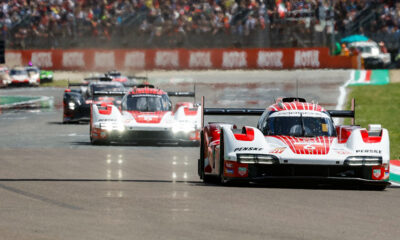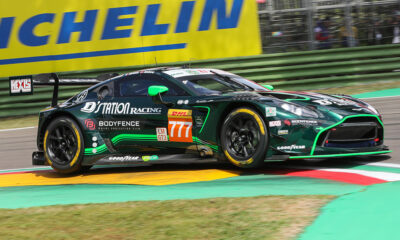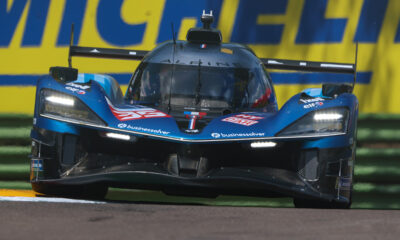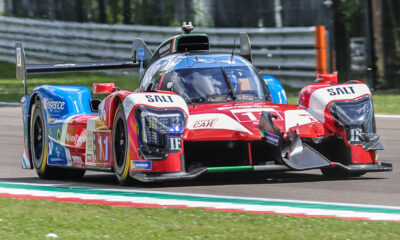The No. 94 Peugeot 9X8 also encountered an issue with a mandatory torque sensor at the 6 Hours of Portimao but was allowed to manage it in a “default” mode rather than follow the No. 7 Toyota GR010 Hybrid in undergoing a driveshaft change.
Toyota’s second-placed LMH car lost seven laps due to the driveshaft swap, which came after a decision from the stewards during the second hour of the FIA World Endurance Championship round based on a failure on one of its FIA and ACO-mandated torque sensors.
The driveshaft needed to be changed because the torque sensor, which monitors energy usage per stint as defined in the Balance of Performance, is attached to it.
After the race, Peugeot’s LMH technical director Olivier Jansonnie revealed that the French manufacturer’s No. 94 machine encountered a sensor failure of its own at a later stage in the contest. It was permitted to carry on and completed the race in fifth.
Sportscar365 understands that Peugeot was not asked to make a driveshaft change because it had registered sufficient data through the torque sensor, whereas the Toyota’s sensor failure occurred at an earlier point when fewer data had been collected.
It is unclear at what point the torque sensor has gathered enough data to render a driveshaft change unnecessary.
“It’s a failure with the sensor, and then we have to survive with some sort of default mode and make sure the car could see the end of the race,” said Jansonnie.
“We managed the performance of the car to try to remain within the legality constraints of the BoP.”
Jansonnie explained that the default mode of torque monitoring “forces you to degrade the performance” to remain within the BoP confines.
“It’s managing the power differently, but we have to reduce power in the end,” he said.
Toyota Gazoo Racing’s WEC technical director Pascal Vasselon described the forced driveshaft change as a “harsh decision” for the No. 7 Toyota crew of Jose Maria Lopez, Kamui Kobayashi and Mike Conway who suffered a setback in their championship bid.
Toyota requested to keep its afflicted car running on the default setting, however Vasselon said that this was denied.
“I’m part of the technical working group so I can take part of the blame… we have to find better solutions than to force cars to park and repair for a failure of a sensor which is nothing to do with the team,” said Vasselon.
“It’s a kind of lottery. It has been, I think, quite a harsh decision I would say, to ask us to repair it. Because it clearly could have been possible to keep running.”
Toyota changed the whole left-rear corner of its No. 7 car before returning it to the track. It managed to finish ahead of the LMP2 winner but still came through in ninth overall.
“We’ve done it in 11 minutes which is remarkable,” said Vasselon.
“At Le Mans, you could probably still finish on the podium with a strong race, but 11 minutes in six hours is dead.”
When asked if there is enough time for the torque sensor issues to be solved before the 24 Hours of Le Mans in June, he responded: “I would think that we have chances to find a solution before Le Mans.”
























